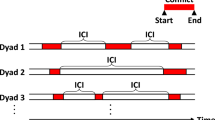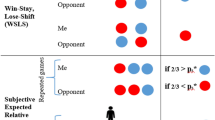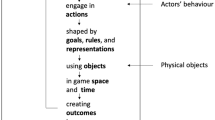Abstract
As NATURE has encouraged scientific workers to think about public affairs, I beg space to remark that equations, describing the onset of the War, and published under the above title in 1919, have again a topical interest, in connexion with the present regrettable rearmament. In revised form: The suffixes 1 and 2 refer to the opposing nations, or groups of nations. The symbol x denotes the variable preparedness for war; t is the time; k is a defence-coefficient’ and is positive and more or less constant; is a fatigue and expense coefficient and is also positive and moderately constant. Lastly, represents those dissatisfactions-with-treaties, which tend to provoke a breach of the peace.
This is a preview of subscription content, access via your institution
Access options
Subscribe to this journal
Receive 51 print issues and online access
$199.00 per year
only $3.90 per issue
Buy this article
- Purchase on Springer Link
- Instant access to full article PDF
Prices may be subject to local taxes which are calculated during checkout
Similar content being viewed by others
Author information
Authors and Affiliations
Rights and permissions
About this article
Cite this article
RICHARDSON, L. Mathematical Psychology of War. Nature 135, 830–831 (1935). https://doi.org/10.1038/135830c0
Issue Date:
DOI: https://doi.org/10.1038/135830c0
This article is cited by
-
Conflicts among \(\varvec{N}\) N armed groups: scenarios from a new descriptive model
Nonlinear Dynamics (2018)
-
A Biased Review of Sociophysics
Journal of Statistical Physics (2013)
-
Chaos in the international arms race
Nature (1989)
Comments
By submitting a comment you agree to abide by our Terms and Community Guidelines. If you find something abusive or that does not comply with our terms or guidelines please flag it as inappropriate.



